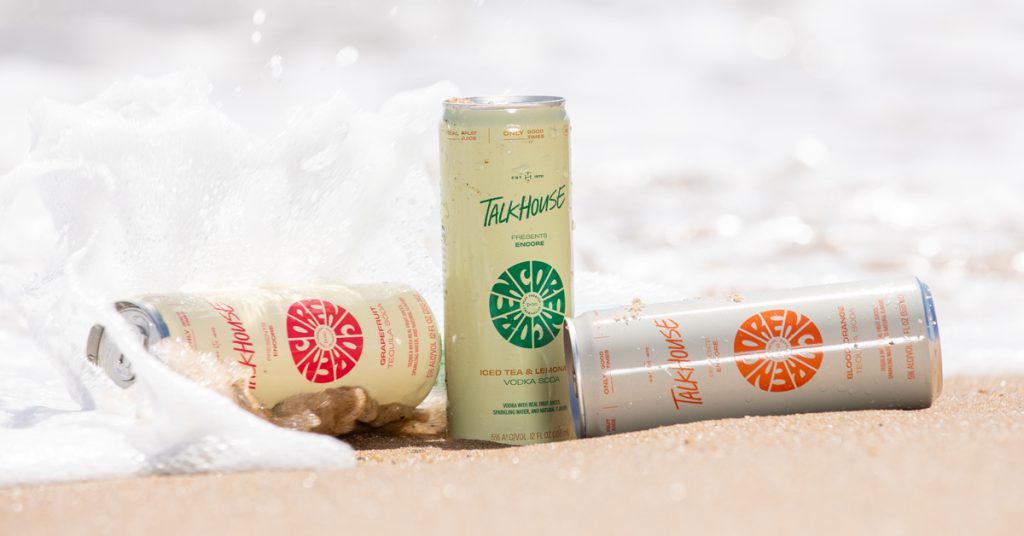
There were many ways entertainment venues aimed to keep the lights on during the pandemic — for a Hamptons bar that regularly hosted musical acts, creating a ready-to-drink (RTD) cocktail was one solution. They just had to pass an alcoholic beverage control law first.
Launched in August 2021, RTD brand Talkhouse Encore is now expanding beyond the radius of its namesake: Amagansett, New York-based Stephen Talkhouse (referred to as the Talkhouse), a neighborhood bar that has featured renowned performers like Paul McCartney or Ed Sheeran alongside local East End talent.
“We were closed during the pandemic and we were trying to think of a way to keep the spirit of this place alive in a new form, and we weren’t sure if we were going to be open again,” said Ruby Honerkamp, who runs the RTD brand while her brother manages the bar alongside their parents.
The Honerkamp family, which purchased and turned the jukebox bar into a live music venue in 1987, came up with the idea of leveraging the bar’s brand into a product. Other RTD companies like Fishers Island Lemonade have emerged from similar stories and found success: the product, now part of Gallo’s portfolio, is a canned version of a popular cocktail at the founder’s family-owned inn.
But tied house laws— federal and state laws that aim to prohibit manufacturers and wholesalers from having undue influence over retailers— don’t allow an entity in one tier to have an interest in another entity in a different tier. In order to connect the family business to a bev-alc product, the family lobbied New York State for an exemption. It took meetings with their local senator and assemblyman, and several months of patience to pass a bill specific to Stephen Talkhouse.
With legal pathways cleared, the next task was to find a “soft balance” between branding the new business in a way that captured the emotional chord of the bar, integrating its historic value points into the future, said Honerkamp. They landed on beachy soft colors threaded into a vinyl and retro-inspired design that pays homage to the bar’s music focus and inception in the 70s.
The RTD’s marketing also plays off the bar, needing to “always be complementary” to what the venue is doing, meaning photography that provides an “old school feeling,” said Honerkamp. But the entities don’t specifically market each other per legal restrictions, aside from the cans appearing at the bar. Still, the Talkhouse customer isn’t the RTD’s primary customer, argues Honerkamp.
“Talkhouse is family,” she said. “Right now, our intention is to continue to build on that family and bring the familiarity and what we’re so proud of in terms of our values at the Talkhouse to other places.”
Overall sales are up by 70% year-to-date, and in the last 12 months Talkhouse Encore has partnered with New York-based distributor, LNJ Brands, to sell over 12,000 cases throughout New York. Sales are split evenly between on-premise and off-premise, with Talkhouse Encore currently selling over 50 cases per month at each of its retail locations, according to the brand.
As RTDs make gains on-premise, Honerkamp has leveraged two selling points based on her experience behind the bar to get traction at high-volume venues: the consistency offered by a canned cocktail married with slightly more premium flavors and cocktail styles than other RTDs. Similar strategies have worked for other regional canned cocktail brands like Philadelphia-based company Surfside, which carved out a niche beginning in its home state as consumers began to experience seltzer fatigue.
The product itself includes six fruit-forward flavors meant to emulate casual bar cocktails: Orange Tequila Soda, Cranberry Vodka Soda, Grapefruit Tequila Soda, Lime Vodka Soda, Hampton Mule and the newer Vodka Soda Iced Tea & Lemonade.
As Honerkamp has pushed sales beyond the Hamptons, the family story stands out amongst a saturated coldbox, she said, even in areas like Albany and Syracuse where the East End bar is unknown. The brand will continue to use that sales lever before expanding into new states.
“They very much appreciate the nostalgia and authenticity behind the brand,” Honerkamp said.